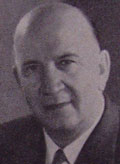 |
Johannes de Klerk
b. 22 Jul 1903, Burgersdorp, Burgersdorp District, Cape Colony
d. 22 Jan 1979, Krugersdorp, Transvaal Province, Republic of South Africa |
| Title: |
Acting State President of the Republic of South Africa :: Waarnemende Staatspresident van die Republiek van Suid-Afrika |
| Term: |
10 Apr 1975 - 19 Apr 1975 |
| Chronology: |
10 Apr 1975, took an oath of office as Acting State President [1] |
| |
19 Apr 1975,
ceased to exercise the functions of office upon the installation of a successor [2] |
| Biography: |
| Son of Willem Johannes de Klerk, minister of the Dutch Reformed Church, and grandson of Johannes Cornelis van Rooy, member of the Senate of the Union of South Africa (1929-1939); went to school at Potchefstroom; studied at the Potchefstroom University College for Christian Higher Education (1923-1926) where he obtained a bachelor's degree and the higher education diploma; was actively involved in student life and was chairman of the Students' Representative Council (1925-1926); taught at Nylstroom and on the Witwatersrand (1927-1945) and was headmaster of the Primrose Afrikaans School in Germiston, near Johannesburg (1937-1945); accepted the post of secretary to the White Workers' Protection Union (Blankewerkers-beskermingsbond); was appointed organising secretary of the Reunited National Party (Herenigde Nasionale Party, HNP; from 1951 Nasionale Party) on the Rand (1947-1948); was instrumental in securing the victory of the HNP in the 1948 General Elections; made chief secretary of the HNP in the Transvaal (1948-1954); elected a member of the Transvaal Provincial Council (1949-1954), representing the constituency of Krugersdorp; and was appointed to serve on the Executive Committee (1949-1951); supported his brother-in-law, Johannes Gerhardus Strijdom, in contest over the party leadership in 1954; as a reward, he was made a member of the Senate (1955-1976) and appointed minister of labour and public works (1955-1958) in the government of Strijdom; served as minister of labour and mines (1958-1961), minister of interior and mines (1961), minister of interior, labour and immigration (1961), minister of interior, education, arts and science (1961-1966), minister of education, arts, science and information (1966-1967), minister of national education (1967-1968); an avowed conservative, he played an important part in formulating the practical implications of separate development in South Africa; was seen as a possible candidate for the state presidency in 1967, but Theophilus Ebenhaezer Dönges received the majority of votes (19 Jan 1967); he was again approached to stand as a candidate for the state presidency, but he stood down in favour of Jacobus Johannes Fouché; succeeded Jozua François Naudé as President of the Senate (1969-1976); after the expiration of the term of Fouché as State President (9 Apr 1975) and before the inauguration of Nicolaas Diederichs, he exercised the functions of Acting State President (10 Apr 1975 - 19 Apr 1975). |
| Biographical sources: "Dictionary of South African Biography", ed. by C.J. Beyers (Pretoria: Nasional Boekhandel Bpk. for Human Sciences Research Council, 1987), 5:176-177. |
| |
| [1] |
Republic of South Africa Government Gazette, Cape Town, 11 April 1975 / Staatskoerant van die Republiek van Suid-Afrika, Kaapstad, 11 April 1975, Vol. 118, No. 4665, p. 1. |
| [2] |
Republic of South Africa Government Gazette, Cape Town, 19 April 1975 / Staatskoerant van die Republiek van Suid-Afrika, Kaapstad, 19 April 1975, Vol. 118, No. 4676, p. 1; South Africa 1975: Official Yearbook of the Republic of South Africa (Johannesburg: South African Department of Information, 1975), p. 961. |

